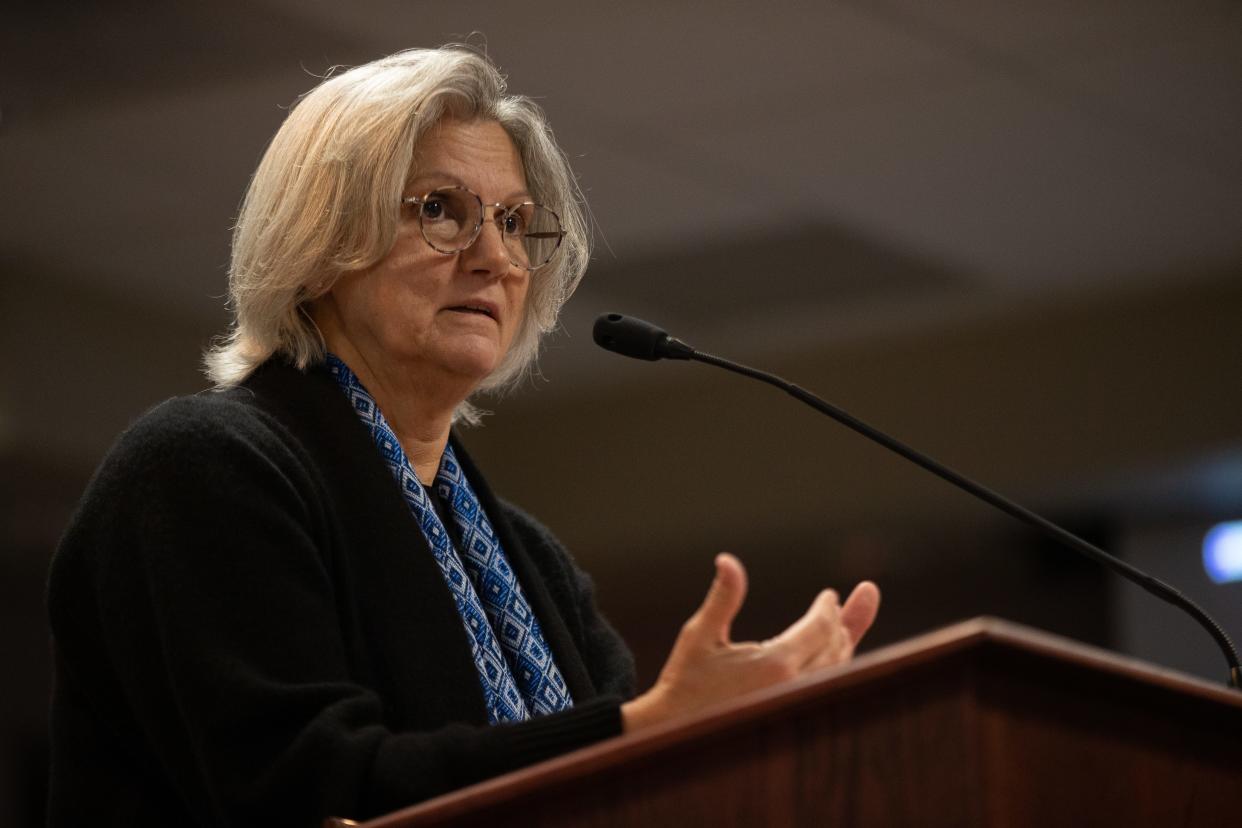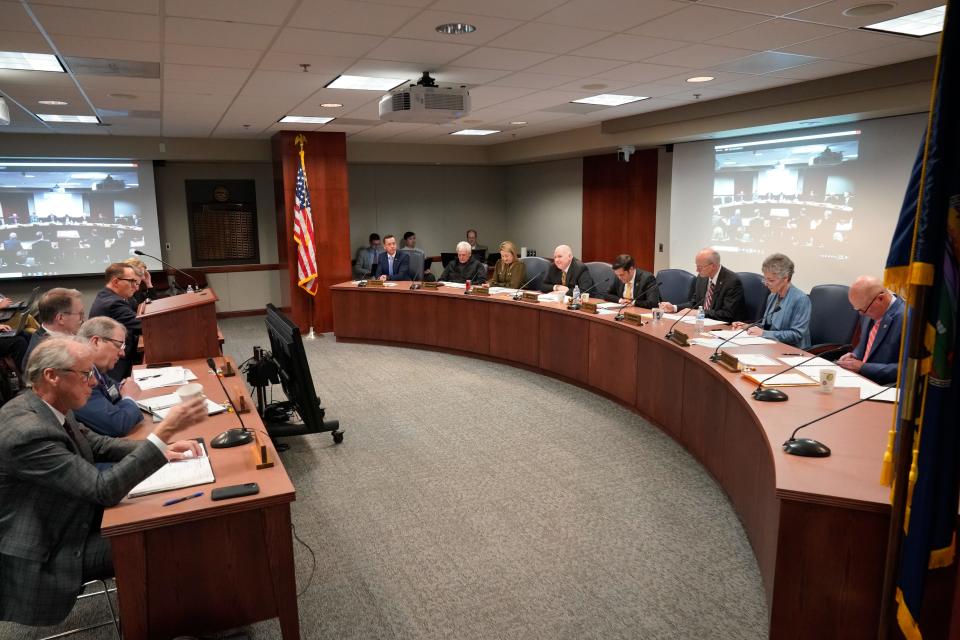Over other universities' objections, Kansas Regents to let KU offer duplicate degree

A routine request from the University of Kansas to begin offering a new degree took on a different tenor Wednesday as the Kansas Board of Regents considers a new framework to aggressively tamp down on duplicate degrees and programs across the state university system.
The Regents on Wednesday approved KU's request to begin offering a bachelors degree in criminal justice at its Edwards Campus in Johnson County, over the objections of representatives from Fort Hays State and Wichita State university, which both offer that degree.
More:A proposed Regents framework could cut duplicate majors across Kansas' six state universities
The request, which had been filtered up through various academic committees, had been met with controversy and split votes along much of that process, especially as the Regents later this spring consider adopting a framework, developed by Maryland-based enrollment consultant rpk GROUP, that could ultimately recommend elimination or reduction of duplicated majors across the Regents' six state universities.
KU says degree justified by Johnson County demand for criminal justice majors
KU developed its plans for a hybrid online and in-person criminal justice degree after seeing an increasing demand for law enforcement, corrections, policy and court administration workers in the greater Kansas City metro area and St. Louis, said provost Barbara Bichelmeyer.
That's why KU proposed the degree to be based at its Edwards campus, which focuses on degree completion, in Overland Park. While the hybrid degree will be a four-year bachelors, it is designed to be the third- and fourth-year of the degree from students who would transfer in from other two-year institutions, like Johnson County and Kansas City, Kansas, community colleges.
More:How can Kansas put students into teacher pipeline? Start with more money, task force says.
Bichelmeyer said the university had received support from numerous government leaders and agencies in the Kansas City-region, who point to a need for workers with criminal justice training and knowledge. Per the university's projections, the program would likely enroll about 35 full-time students and 30 part-time students by its third year of operation, although Bichelmeyer noted that could be an underestimate.
Stuart Day, dean of the Edwards Campus and its School of Professional Studies, said the university's data shows that 75% of students who take online programs do so within a 100-mile radius of their homes, and many are well outside the areas meant to be served by any of the other Regents institutions, namely Fort Hays and Wichita State.
"Data from KBOR's KHEStats website indicates that WSU and FHSU draw few students from Johnson County and Wyandotte County into their criminal justice programs, so there does not appear to be a threat that KU will take students from these two institutions," Day said.
Fort Hays and Wichita State say KU degree would be a duplicate

However, representatives from Fort Hays State and Wichita State remained concerned that a new criminal justice degree in Johnson County could pull students away from their respective institutions.
In a letter to Bichelmeyer, Fort Hays State provost Jill Arensdorf pointed out that her university has offered on-campus and online criminal justice degree programs since 1996, with many of its classes used for other non-degree training by remote students.
Similarly, Wichita State provost Shirley Lefever wrote that KU's proposal is a virtual copy of Wichita State's with many of the same classes.
"A review of KU's program appears to duplicate WSU's BS in Criminal Justice and thus, the impact on enrollment at both institutions warrants further investigation to assess the actual need for another similar program providing students the same opportunity and outcome (talent pipeline)," Lefever wrote. "A second similar program within the Kansas Board of Regents system, we believe, presents a threat to the market share because of the limited differentiation between the two programs."
rpk GROUP analysis on duplicate programs lingers over degree discussion
Although disagreements and protests over duplicated Regents programs are not by themselves unusual, the discussion takes a different tenor as the board considers adopting the rpk GROUP framework to identify and potentially act on duplicated programs and degrees across the state universities.
The consultant's analysis last fall showed that out of 688 programs offered across the six state universities, only about half were unique. About 58% of duplicated programs were deemed in need of "optimization" to improve enrollment, while 26% of duplicated programs were categorized for "review and monitoring."
By itself, the framework does not necessarily suggest specific actions for the Regents to take. But faculty representatives have expressed strong concerns that the framework could be the first step in justification of wholesale elimination of programs and departments across Kansas' public higher education system, especially as the schools struggle with flat or declined enrollment.
More:Kansas' colleges, universities continue to see downward enrollment spiral — with a few exceptions
Bichelmeyer, in responding to Fort Hays and Wichita State's concerns, pointed out rpk GROUP representatives' comments that duplication is not inherently a bad thing under their model. Programs may be duplicated based on need or distinction, she said, and in Johnson County, KU believes it has found a need.
"The word 'duplication,' is not, in and of itself, an inappropriate thing to do," Bichelmeyer told the Regents.
The board passed KU's proposal unanimously. Regents chair Jon Rolph said he appreciated the discussion, even with disagreements, since it represented a healthy culture. The board will tentatively consider adopting the rpk GROUP framework later this spring, after the board and a sub-committee review feedback from each of the state universities' stakeholders.
"It's an interesting time for us, because we're kind of in the gray zone of the rpk (GROUP) study and further defining our perspectives on duplication and working that out, then waiting on some feedback on how we evaluate new programs and programs that need to go away," Rolph said.
Rafael Garcia is an education reporter for the Topeka Capital-Journal. He can be reached at rgarcia@cjonline.com or by phone at 785-289-5325. Follow him on Twitter at @byRafaelGarcia.
This article originally appeared on Topeka Capital-Journal: Kansas Regents approve duplicate KU degree as rpk GROUP analysis looms

